The following is a list of reservoirs in Singapore.
There are a currently 17 reservoirs which are designated as national water catchment areas and are managed by the Public Utilities Board (PUB) of Singapore.[1][2]
Reservoirs
| Name | Surface area (Total) |
Storage capacity (m3) | Period of construction | Construction order | Image | Remarks |
|---|---|---|---|---|---|---|
| Bedok Reservoir | 88 ha | 12,800,000 | 1981[3]-1986[4] | 14[5] |  |
|
| Jurong Lake | 70 ha | 11[5] |  |
In addition to a number of artificial islands such as the Chinese and Japanese Gardens, Jurong Lake is planned to be a future recreational hub for the western side of the island. | ||
| Kranji Reservoir | 450 ha[6] | 15,850,000[6] | 1971-1975[3] | 5[5] | 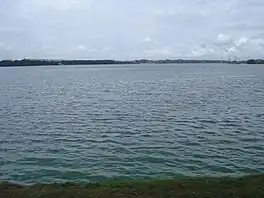 |
|
| Lower Peirce Reservoir (formerly called "Kallang River Reservoir" and "Peirce Reservoir") | 6 ha | 2,800,000[7] | 1900-1912[3] | 2[5] | 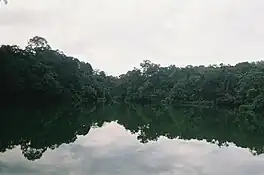 |
Source of the Kallang River, Singapore's longest river. Connects to Upper Thomson Road by a waterside trail. |
| Lower Seletar Reservoir | 360 ha | 9,400,000 | 1941-1969[3] | 13[5] | .jpg.webp) |
|
| MacRitchie Reservoir (formerly called "Thomson Road Reservoir") | 4,200,000[7] | 1890-1894[3] | 1[5] | 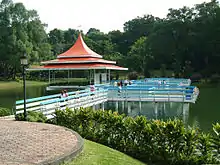 |
||
| Marina Reservoir | 240 ha[8] | 2005-2008[9] | 15[5] | 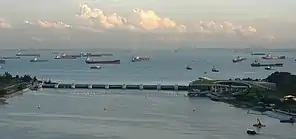 |
||
| Murai Reservoir* | 1977-1981[3] | 7[5] | ||||
| Pandan Reservoir | 1971-1974[10] | 6[5] |  |
|||
| Poyan Reservoir* | 1977-1981[3] | 8[5] | ||||
| Pulau Tekong Reservoir* | 1977-1979[10] | 12[5] | ||||
| Punggol Reservoir | 16[5] | Opening ceremony held on 3 July 2011. Together with Serangoon Reservoir will increase catchment area by 5,500ha. | ||||
| Sarimbun Reservoir* | 1977-1981[3] | 9[5] | ||||
| Serangoon Reservoir | 17[5] |  |
Opening ceremony held on 3 July 2011. Together with Punggol Reservoir will increase catchment area by 5,500ha. | |||
| Tengeh Reservoir* | 1977-1981[3] | 10[5] | ||||
| Upper Peirce Reservoir | 304 ha | 27,800,000[7] | 4[5] | 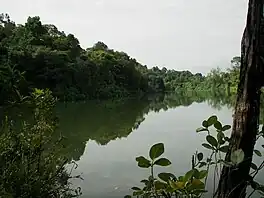 |
||
| Upper Seletar Reservoir (formerly called "Seletar Reservoir") | 324 ha | 3[5] |  |
*located in SAF restricted zones
Reservoirs that are currently in service
Reservoirs that are no longer in service
References
- ↑ "Local Catchment Water". PUB, Singapore's national water agency. 2 August 2012. Archived from the original on 25 July 2012. Retrieved 10 September 2012.
- ↑ PUB. "PUB, Singapore's National Water Agency". PUB, Singapore's National Water Agency. Retrieved 3 August 2018.
- 1 2 3 4 5 6 7 8 9 Chia, Lin Sien; Khan, Habibullah; Chou, L. M. (1988). The Coastal Environmental Profile of Singapore. The WorldFish Center. p. 37. ISBN 9711022486.
- ↑ Sandhu, Kernial Singh; Wheatley, Paul (1989). Management of Success: The Moulding of Modern Singapore. Institute of Southeast Asian Studies. p. 778. ISBN 9813035420.
- 1 2 3 4 5 6 7 8 9 10 11 12 13 14 15 16 17 Douglas Amrine, ed. (2011). Singapore at Random. Didier Millet. p. 17. ISBN 978-9814260374.
- 1 2 Appan, Adhityan; Wang, Hong (2000). "Sorption Isotherms and Kinetics of Sediment Phosphorus in a Tropical Reservoir" (PDF). Journal of Environmental Engineering. 126 (11): 993–998. doi:10.1061/(ASCE)0733-9372(2000)126:11(993). Archived from the original (PDF) on 5 March 2016.
- 1 2 3 Chong, Terence (2010). Management of Success: Singapore Revisited. Institute of Southeast Asian Studies. p. 422. ISBN 978-9814279857.
- ↑ "Dealing with Water Scarcity in Singapore: Institutions, Strategies, and Enforcement". The World Bank. 2006. Retrieved 14 September 2012.
- ↑ Kristiana, R.; Antenucci, J. P.; Imberger, J. (2011). "Sustainability assessment of the impact of the Marina Bay development on Singapore: Application of the index of sustainable functionality". International Journal of Environment and Sustainable Development. 10: 1. doi:10.1504/IJESD.2011.037688.
- 1 2 Ng, Peter K. L.; Tan, Hugh T. W. (2011). Singapore Biodiversity: An Encyclopedia of the Natural Environment and Sustainable Development. Didier Millet. p. 60. ISBN 978-9814260084.
This article is issued from Wikipedia. The text is licensed under Creative Commons - Attribution - Sharealike. Additional terms may apply for the media files.
